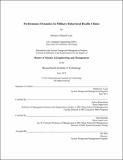| dc.contributor.author | Lyan, Dmitriy Eduard | |
| dc.date.accessioned | 2014-03-31T21:08:59Z | |
| dc.date.available | 2014-03-31T21:08:59Z | |
| dc.date.issued | 2012-06 | |
| dc.identifier.uri | http://hdl.handle.net/1721.1/85976 | |
| dc.description.abstract | The prevalence of Post Traumatic Stress Disorder (PTSD) and other related behavioral health conditions among active duty service members and their families has grown over 100% in the past six years and are estimated to afflict 18% of the total military force. A 2007 DoD task force on mental health concluded that the current military psychological health care system is insufficient to meet the needs of the served population. In spite of billions of dollars committed to hundreds of programs and improvement initiatives since then, the system continues to experience provider shortages, surging costs, poor access to and quality of care as well as persistently high service-related suicide rates. We developed a model to study how the resourcing policies and incentive structures interact with the operations of military behavioral health clinics and contribute to their ability to provide effective care. We show that policies and incentives skewed towards increased patient loads and improvement in access to initial care result in a number of vicious cycles that reinforce provider shortages, increase costs and decrease access to care. Additionally we argue that insufficient informational feedback contributes to incorrect attributions and the persistence of ineffective policies. Finally we propose a set of policies and enabling performance metrics that can contribute to sustained improvement in system performance by turning death spirals into virtuous cycles leading to higher provider and patient satisfaction, better quality of care and more efficient resource utilization contributing to better healthcare outcomes and increased levels of medical readiness. | en_US |
| dc.rights | Attribution-NonCommercial-ShareAlike 3.0 United States | * |
| dc.rights.uri | http://creativecommons.org/licenses/by-nc-sa/3.0/us/ | * |
| dc.subject | military, behavioral health, Post Traumatic Stress Disorder (PTSD), health clinics | en_US |
| dc.title | Performance Dynamics In Military Behavioral Health Clinics | en_US |
| dc.type | Thesis | en_US |
